newscap
A bimonthly newsletter of WICHE highlights and activities
July 2019 Edition
Notes from the President
The value of postsecondary education is a hot topic in higher education circles today. But while everyone is talking about it, most are coming at it from very different perspectives. It reminds me of a potluck dinner without guidance — everyone brings a great contribution but it’s going to take a bit of creativity and open-mindedness to see how it all fits together.
People understandably want to know what a credential will buy them in the workplace, and the Institute for Higher Education Policy and the American Association of State Colleges and Universities, in partnership with the Bill & Melinda Gates Foundation, recently launched the Commission on the Value of Postsecondary Education to help answer that question. With a team of experts, they’re examining what we currently know and what we are learning about the economic value of postsecondary education.
Others, including the Gates Foundation and HCM Strategists, strongly affirm the value of a postsecondary education but are putting the emphasis on how best to communicate the message and whom to communicate it to. Is it through a coordinated network of organizations relying on student voices? Do we need to convince policymakers about the value of postsecondary education? Students? Parents? Higher education leaders? Arguably most of those folks already are true believers, and the hard work undoubtedly is convincing those who are not engaged in postsecondary education that they should be.
I recently participated in a thought-provoking summer summit held by the American Council on Education in Portland, Ore., where institutional leaders talked about how market trends influence institutional decision making. This was yet another way of thinking about the value of higher education. For them, it is about connecting with the workforce needs of their communities and their states and making wise institutional decisions that result in student success.
There are certainly other approaches that policymakers and experts are taking to assess the value of postsecondary education. A major challenge, and perhaps an opportunity, is that as leaders in postsecondary education, we haven’t agreed on what we mean. We used to just assume there was value (even if not everyone could access it) and for the most part, so did everyone else. Or so we thought. The conversations that are happening now are important and necessary, particularly in the context of legitimate concerns around affordability and employability. We need to engage in this dialogue, confront our challenges, and find productive ways to move forward so that we can prepare our students, and our potential students, for success in the workplace and in society. It’s for everyone’s benefit.
WICHE Commission news
WICHE is pleased to welcome five Commissioners newly appointed in recent weeks:
WICHE President Demarée Michelau also expressed thanks to six departing Commissioners for their service to the organization over the past several years: Laurie Nichols, president of the University of Wyoming; Dave Buhler, Utah Commissioner of Higher Education; Vincent Leon Guerrero, former special assistant to the governor of Guam; Carmen Fernandez, past president of Northern Marianas College; Idaho State Rep. Julie Van Orden; and former Utah State Sen. Peter Knudson.
WICHE Commission approves FY 2020 budget, workplan, and new tuition policy for the Western Regional Graduate Program
Approval of WICHE’s FY 2020 budget and workplan, plus fine-tuning one of the organization’s fast-growing student access programs, were among the agenda items for the WICHE Spring Meeting, held May 20-21 in Bismarck, N.D. The theme, “Higher Education in the West: Imagining the Future,” was underscored in plenary sessions featuring valuable perspectives on various topics: a futurist’s take on societal, labor market, and technology changes influencing postsecondary education; the potential of digital resources to create new pathways for learners; an overview of the cultures, governance, and economies of WICHE’s 16th and newest member, the U.S. Pacific Territories & Freely Associated States. The leaders of three accrediting agencies also addressed trends and developments shaping their efforts related to ensuring student success and institutional continuous improvement.
The WICHE Commission approved a new policy that provides more flexibility to institutions offering graduate programs to nonresident students through the Western Regional Graduate Program (WRGP). Beginning in summer/fall 2020, institutions can set the tuition rate for nonresidents at up to 150 percent of the resident-tuition rate, aligning WRGP’s tuition policy with that of WICHE’S largest student access program, the Western Undergraduate Exchange (WUE).
Some institutions may opt not to increase their WRGP tuition rate and continue to charge resident tuition. Students already enrolled in a WRGP program will be “grandfathered in” under the tuition-setting rules that prevailed when they were enrolled.
Use the WRGP Savings Finder to browse the 950 graduate programs at 58 public institutions in the West currently available through WRGP. For additional information, contact WRGP Program Director Margo Colalancia at mcolalancia@wiche.edu or 303.541.0214.
Russ Poulin leading WCET and serving as WICHE VP of technology-enhanced education
Russ Poulin has been appointed vice president of technology-enhanced education for WICHE and executive director of WCET (WICHE Cooperative for Educational Technologies), WICHE President Demarée Michelau announced at the organization’s biannual meeting in Bismarck, N.D.
In his new role, which he assumed June 1, Poulin will lead WCET’s team of 12 executing an array of programs and initiatives related to higher education and technology, and will oversee a network of 385 WCET-member colleges, universities, and other North American organizations encompassing 6,000 active WCET constituents.
Poulin, who has served as WCET senior director of policy, analysis, and strategic alliances for the past several years, was hired in 1994 from the North Dakota University System, where he coordinated distance education. Over the years, he has become a linchpin contributor and leader for WCET in nearly all facets of its operations and has been instrumental in building its membership network. Read more here
National summit focuses on Native student
postsecondary attainment
WICHE’s second annual Native American-Serving, Nontribal Institutions National Summit, July 8-10 in Denver, attracted nearly 90 higher education leaders, practitioners, tribal community leaders, and representatives of education organizations and associations whose missions focus on the educational success of Native students. Participants discussed effective strategies to increase American Indian and Alaska Native students’ postsecondary attainment rates as well as issues unique to the 22 U.S. colleges and universities federally defined as Native-Serving Institutions (NSIs), based on their American Indian or Alaska Native student populations exceeding 10 percent. Lumina Foundation provided funding support for the summit in addition to its three-year grant to WICHE to help NSIs develop networks, gain information on key state and federal legislative and policy issues, and tailor culturally-relevant high impact practices to help their students succeed. Summit participants received a new WICHEpublication that provides data baselines related to Native-student graduation, retention, and remediation rates at the NSIs.
Leaders of the nation’s four regional higher-education compacts meet in Boulder
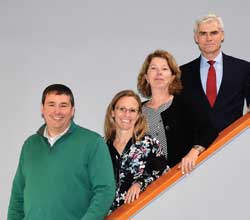
On May 7, WICHE President Demarée Michelau hosted a get-together in Boulder of the leaders of WICHE’s counterpart organizations in the South, the Midwest, and the Northeast. The four compact presidents also met with Sally Johnstone, president of the National Center for Higher Education Management Systems (NCHEMS), and Robert E. Anderson, president of the State Higher Education Executive Officers Association (SHEEO), the other organizations that are located with WICHE in the State Higher Education Policy Center. Shown during a break in their discussions are, from left, Stephen Pruitt, president of the Southern Regional Education Board, who took office in July 2018; Michelau, appointed in December 2018; Susan Heegaard, selected as president of the Midwestern Higher Education Compact in September 2018; and Michael Thomas, president and CEO of the New England Board of Higher Education since 2013.
Adams State University joins the Interstate Passport® Network
Adams State University recently became the first Colorado postsecondary institution to join the Interstate Passport Network, a nationwide network of two- and four-year colleges and universities managed that allows students to transfer lower-division general education credits as a block to any network member institution. The network, managed by WICHE, now consists of 31 institutions across 13 states. Interstate Passport’s block transfer program is based on a set of learning outcomes rather than individual courses. Students who complete their institution’s lower-division general education block earn a Passport, assuring that the coursework will be accepted as completion of general education at all member institutions and minimizing the uncertainty that often accompanies a student’s transfer to a new institution, especially one in a different state.
“Adams State University sees tremendous benefits and advantages to the Interstate Passport,” said Cheryl D. Lovell, president of Adams State. “We are also very excited to provide additional ways to serve students, especially historically under-served populations, by providing a seamless transfer option into one of our high-quality undergraduate programs.”
Since the Interstate Passport Network launched in 2016, member institutions have awarded over 25,500 Passports,” according to Anna Galas, director of academic leadership initiatives at WICHE. “As the Interstate Passport Network continues to grow, we expect to see considerably larger numbers of transfer students become motivated to complete their degrees.” For more on the Interstate Passport, visit interstatepassport.wiche.edu.
Equipping prospective teachers to support the mental wellness of students

What skills and knowledge do classroom teachers need to more effectively promote the emotional, psychological, and social well-being of students? That was the question on the table at the recently held first meeting of a workgroup representing leaders of teacher-preparation programs at a dozen universities in four Western states. The group was convened as part of the federally funded Mountain Plains Mental Health Technology Transfer Center, co-administered by WICHE’s Behavioral Health Program and the University of North Dakota College of Nursing and Professional Disciplines.
The goal is to make formal recommendations on how to incorporate mental-health and wellness training into preparation programs so that newly minted teachers are better equipped to recognize warning signs, provide effective classroom management, and take advantage of resources for support and referral.
The four states represented in the group are Colorado (University of Denver, Metropolitan State University of Denver), Montana (Montana State University, University of Montana’s Missoula and Western campuses), North Dakota (Mayville State University, University of North Dakota, Valley City State University), and South Dakota (South Dakota State University, University of Sioux Falls, University of South Dakota).
Western Academic Leadership Academy convenes its fifth cohort of aspiring academic leaders
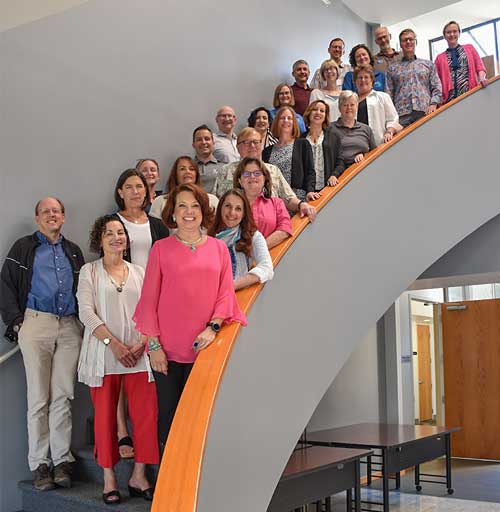
The Western Academic Leadership Academy convened its fifth cohort of aspiring academic leaders for an intensive seminar, July 10-12, at WICHE’s learning center in Boulder. Fifteen individuals from eight states (AK-3; AZ-1; CA-1; CO-3; HI-1; ID-2; MT-2; OR-1; and WA-1) participated in general sessions on a range of topics related to the roles and responsibilities of the chief academic officer as well as small group discussions of case studies and career exploration. The customized curriculum includes a special focus on higher education issues in the West.
The 2019 cohort will continue to participate in activities mentored by the faculty throughout the year with the culminating seminar taking place at the annual meeting of the Western Academic Leadership Forum (the Forum) in April 2020. The faculty, all sitting or recently retired provosts, are members of the Forum which sponsors the Academy. Guest faculty with special expertise in such topics as managing external relations, strategic partnerships, and legal issues; and promoting diversity and inclusion; also led some of the sessions.
The Forum’s executive committee launched the Academy in 2014 to build a more robust pipeline of talented academic leaders prepared to advance to the chief academic level in anticipation of a significant number of retirements in that role in the WICHE region during this decade. When the 2019 cohort graduates in April 2020, the Academy will have trained nearly 75 new leaders for the WICHE region.
Recent happenings in the Aloha State
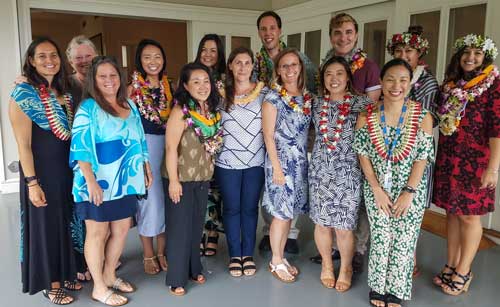
Interstate Commission for Higher Education, with
Hawai‘i doctoral psychology faculty and interns on
June 25th 2019. Back row, L-R: HI-PIC faculty:
Jamie Armstrong Hernandez and Donna Macri; and
interns: Mei-Lin Lawson, Michelle Murata, Ned
Kimble, Clifford Green, Lyndsey Tom, Nani Jensen.
Front row: Lorri Bolton, HI-PIC faculty; Huna Yim-
Dockery, intern; Katlyn Hale, HI-PIC Program
director; Demi Michelau, WICHE president; and
Andrea Hiura and Trina Orimoto (HI-PIC faculty).
University of Hawai’i President and WICHE Commissioner David Lassner hosted a reception to welcome WICHE President Demi Michelau on June 18 in Honolulu. Attendees included Lee Putnam, chair of the university’s Board of Regents; several campus and system leaders, and representatives of the Department of Education. Other participants included Hawai’i’s two other gubernatorially-appointed commissioners, Carol Mon Lee, attorney and retired associate dean of the university’s Richardson School of Law, and Colleen Sathre, vice president emeritus of the university; along with former WICHE Commissioners Roy Ogawa, senior director of the Ogawa, Lau, Nakamura and Jew law firm, and JD Watumull, president of Watumull Properties Corporation.
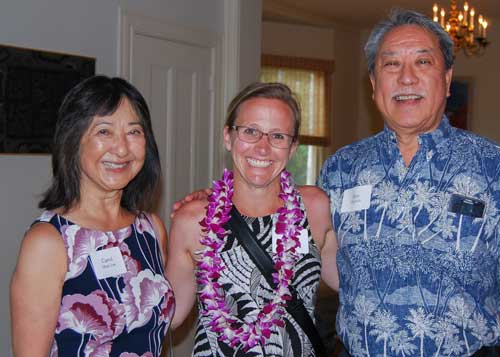
Current WICHE Commissioner Carol Mon Lee and
former Commissioner Roy Ogawa extend their
Alohas to WICHE President Demi Michelau at the
June 18 reception.
Michelau also had the pleasure of addressing the graduation ceremony for the doctoral psychology interns at the Hawai‘i Psychology Internship Consortium (HI-PIC) on June 25 in Honolulu. HI-PIC is a partnership between the Hawai‘i state Departments of Public Safety, Education, and Health as well as the WICHE Behavioral Health Program and was created in 2012 to help build the behavioral health workforce in the state. The program has been a success, with over 60 percent of graduates staying and working on the islands as psychologists after internship graduation.
University of Idaho honored for new faculty-productivity data tool
The Western Academic Leadership Forum recently presented its 2019 Colleagues’ Choice Award to the University of Idaho for an innovative faculty-productivity data tool designed to reduce redundancy and administrative burden for academic deans, chairs, and other senior higher education officials. The tool was selected from a field of submissions last year to the Academic Leaders Toolkit, a best-practice-sharing clearinghouse established by the Forum and its sister organization, the Western Alliance of Community College Academic Leaders.
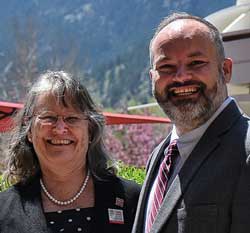
Campbell, Director of Assessment and
Accreditation, University of Idaho
The cloud-based system, which was built in-house using Qualtrics survey software, streamlines the collection, reporting, and analysis of data necessary for intra- and extra-institutional purposes that include evaluation, promotion, and tenure assessment.
In a nod to the potential broader value of the tool — and in the cross-institutional, idea-sharing spirit that characterizes the Forum’s membership — the university’s College of Education, Health and Human Sciences has made it available free of charge on its website.
Reading Room
- The growing influence of WICHE and other education policy organizations headquartered in the Denver-Boulder area was the subject of a feature article, “Here’s Why Colorado is Becoming One Dupont (West),” in the May 6 issue of Forbes. It describes the organizations — WICHE, NCHEMS, SHEEO, the Education Commission of the States (ECS), and the National Conference of State Legislatures (NCSL) — as constituting “a hub of higher education collaboration, innovation, and problem solving — a community of thinkers uniting with a network of doers.”
- A case study of the North American Network of Science Labs Online (NANSLO), headquartered at WICHE from 2011 to 2016, is included in a new report by Asia-Pacific Economic Cooperation (APEC) on promising practices and design principles in digital workforce-development curriculum delivery. NANSLO was an international consortium of science laboratories operated by accredited institutions in the U.S. and Canada that offered students real-world lab experience online. See the case study in Appendix D of the APEC report.
- The latest edition of WICHE Insights, Tuition & Fees in the West 2018-19: Trends and Implications, discusses WICHE’s annual survey of 350-plus Western public colleges and universities, and spotlights trends in state appropriations, financial aid programs, and student fees. The full survey results and a set of interactive dashboards can be seen here.
Comings and goings at WICHE
Pat Shea, WICHE’s director of academic leadership initiatives, will retire June 30 after a 23-year career championing innovation and improvement in higher education, including development of the pathbreaking Interstate Passport® Networkthat facilitates friction-free transfer of lower-division, outcomes-based general education. Shea’s many accomplishments include directing the Western Alliance of Community College Academic Leaders and the Western Academic Leadership Forum – membership organizations representing chief academic officers from the two- and four-year postsecondary sectors. She previously served as associate director of WCET, where she managed a wide range of projects and programs serving its higher education and corporate members in 45 states and six countries.
Anna Galas, Interstate Passport program manager for the past 18 months, on July 1 will succeed Pat Shea as director of academic leadership initiatives. Affiliated with WICHE since 2014, Galas initially served as a consultant and database coordinator for the WICHE Online Course Exchange. She has more than 20 years of professional experience in program administration, project management, and team coordination in higher education at the local, county, state, and national levels.
Suzanne Benally joined WICHE on May 1 as director of its Native American-Serving, Nontribal Institutions initiative, a Lumina Foundation-funded effort aimed at reducing the postsecondary attainment gap for American Indians and Alaska Natives. For the past eight years, Benally has served as executive director of Cultural Survival, a nonprofit organization dedicated to advancing the rights and cultures of indigenous communities worldwide. Previously, she held several administrative and teaching positions at Naropa University in Boulder, Colo., was director of education programs at the American Indian Science and Engineering Society, and earlier she directed WICHE’s Institute on Ethnic Diversity.
Cherie Curtin joined the WICHE staff as an administrative assistant for the Interstate Passport initiative on June 12, following Shelley Pluto’s recent move to another administrative assistant position within WICHE, working with W-SARA and WCET staff. Jeanette Porter returned to the WICHE staff in April as senior administrative coordinator. She previously worked at WICHE for six years.
Paulette Lawrence recently joined WICHE’s Behavioral Health Program, where she will serve as a specialist for Together with Veterans, a suicide-prevention initiative aimed at veterans living in rural areas.
Leadership opportunity opens for Every Learner Everywhere Network
WICHE and WCET are seeking highly-qualified candidates for a unique and challenging position as director of the Every Learner Everywhere Network. In collaboration with a diverse network of organizations, the director will drive improved academic student success (especially for low-income and first-generation postsecondary students and students of color) by leveraging digital learning tools and strategies. The successful candidate will be a visionary leader with expertise in adaptive learning and effective grants management, have demonstrated success with collaborative leadership, and possess exceptional communication skills. Nominations and applications are sought for individuals who bring a demonstrated passion to U.S. higher education’s ability and obligation to better serve the targeted student population. The successful candidate can work remotely but will be required to travel to the WICHE office in Boulder periodically to meet with her/his team as well as to develop excellent relationships with the WICHE and WCET leadership. Interested candidates should apply through WICHE’s ADP Workforce Now portal at http://bit.ly/ELE619. Screening will begin July 26, 2019.
Regional Happenings
- Sept. 12-13: WICHE Legislative Advisory Committee Annual Meeting, Portland, Ore.
- Nov. 7-8: WICHE Commission Fall Meeting, Denver, Colo.
- March 25-27, 2020: Western Alliance of Community College Academic Leaders Annual Meeting, Albuquerque, N.M.
- April 22-24, 2020: Western Academic Leadership Forum Annual Meeting, Juneau, Alaska
On the road: selected recent and upcoming WICHE-led presentations
- Interstate Passport staff at the NASPA Conferences on Student Success in Higher Education, June 17 in Orlando, Fla., and at the AASCU 2019 Academic Affairs Summer Meeting, July 25 in Minneapolis, Minn.
- WICHE President Demarée Michelau at the June 6-7 American Council on Education (ACE) West Summer Summit in Portland, Ore.
- Policy Analysis and Research staff at a meeting of chief admissions officers hosted by Association for Institutional ResearchAnnual Forum, May 28 in Denver, Colo.; and the third meeting of Wyoming’s Educational Attainment Executive Council, May 23 in Sheridan, Wyo.